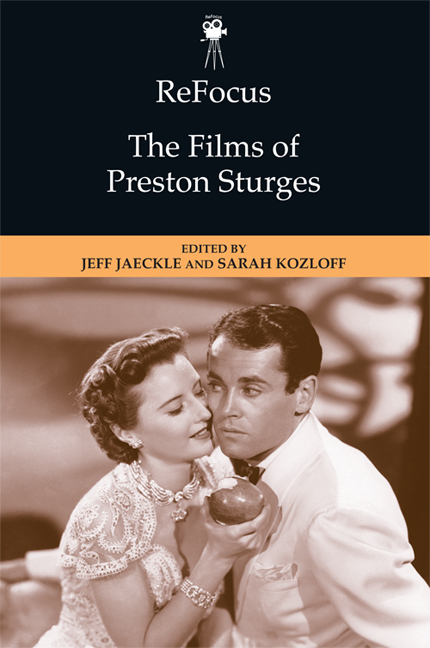Book contents
- Frontmatter
- Contents
- List of Figures
- Notes on Contributors
- Introduction: An Agile Mind—The Many Stands of Preston Sturges
- Part 1 Contexts: Genre, Studio, Authorship
- 1 Preston Sturges and Screwball Comedy
- 2 Preston Sturges, Sullivan's Travels, and Film Authorship in Hollywood, 1941
- 3 To Write and Not Direct
- 4 “The Edge of Unacceptability”: Preston Sturges and the PCA
- Part 2 Cultural Commentary: History and Identity
- Part 3 Technique: Scripting, Performance, Music
- Part 4 Impact: Reception/Reputation
- Index
3 - To Write and Not Direct
from Part 1 - Contexts: Genre, Studio, Authorship
Published online by Cambridge University Press: 05 September 2016
- Frontmatter
- Contents
- List of Figures
- Notes on Contributors
- Introduction: An Agile Mind—The Many Stands of Preston Sturges
- Part 1 Contexts: Genre, Studio, Authorship
- 1 Preston Sturges and Screwball Comedy
- 2 Preston Sturges, Sullivan's Travels, and Film Authorship in Hollywood, 1941
- 3 To Write and Not Direct
- 4 “The Edge of Unacceptability”: Preston Sturges and the PCA
- Part 2 Cultural Commentary: History and Identity
- Part 3 Technique: Scripting, Performance, Music
- Part 4 Impact: Reception/Reputation
- Index
Summary
When Mother Theresa passed away, God meets her at the Pearly Gates. “Theresa! How wonderful to see you! You have been a favorite of mine, so kind, so selfless, so close to god, I mean, to me … So tell me, now you are here and the kingdom of heaven is yours, what would you like to do first?” To which she replies …
“Well, what I really want to do is Direct.”Sturges was no Mother Theresa, but, like everyone else in the film business, he aspired to the director's chair for years. Some of this yearning had to do with ambition: he wanted to be at the top of the food chain. “When I first went to Hollywood,” he wrote in a 1957 letter to his stepfather, “I discovered that the directors were treated as Princes of the Blood … In the beginning I tried to prove that writers were easily as important as directors, then one day I realized that it was easier to become a Prince of the Blood myself than to change the whole social order.” Another factor lay in his inherent sociability; he disliked working alone so much that he hired secretaries/assistants to take down his scripts to provide a receptive audience as he dictated and acted the parts out loud, into the small hours of the night. Being the director meant that he could turn the set into hospitality venues, where he could welcome visitors and press, distribute gifts, and preside over a congenial caravan much as he presided over long nights at the Players, the Los Angeles dinner club into which he poured his energies and disastrously sank his fortune. Of course, Sturges also had artistic and professional reasons for wanting to direct. From the time he started as a playwright in the late 1920s, he hated compromising over casting and hated producers and others changing his texts. As his biographer Diane Jacobs noted, “If Sturges had his way, he'd do everything himself.”
Sturges was unusual among Hollywood screenwriters in that he typically worked on original material (or if it was an adaptation, he changed it radically), and he generally wrote solo, not in the assembly line or partnered fashion then so common.
- Type
- Chapter
- Information
- ReFocus: The Films of Preston Sturges , pp. 66 - 82Publisher: Edinburgh University PressPrint publication year: 2015



